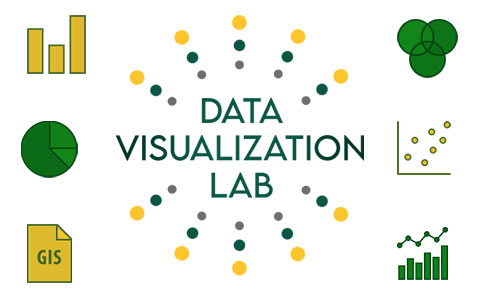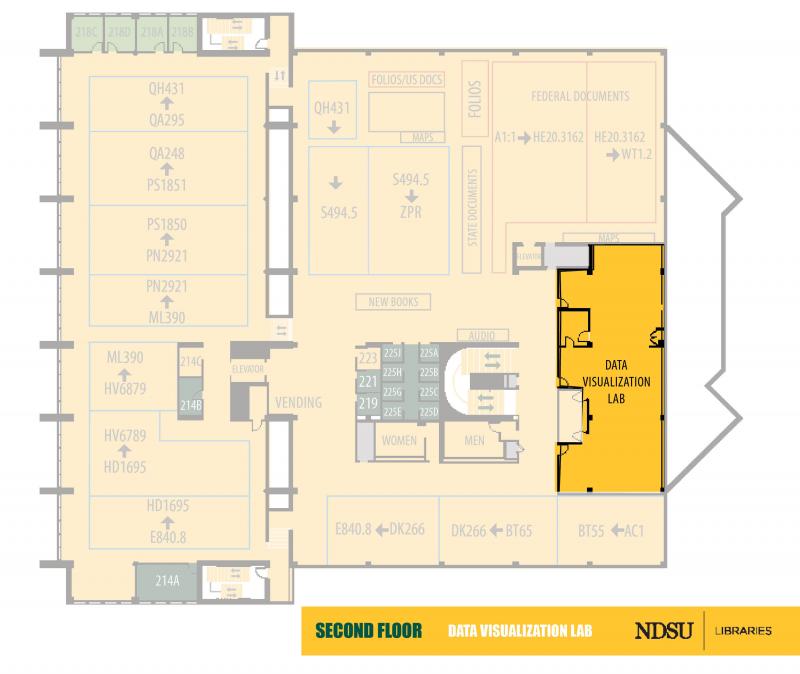
Welcome to NDSU Libraries Data Visualization Lab!
Today's Hours:
| Data Visualization Lab | 12pm – 6pm |
|---|
Hours subject to change in observance of university holidays and semester breaks. See exception details.
Available Computers
LIBR0201 - Data Visualization Lab | All Labs
The Data Visualization Lab is a student and researcher focused space that provides resources and support for finding, analyzing, visualizing, and managing research data. The lab will allow users to develop important research skills of understanding how to manage, share, and preserve research data.
The lab has workstations and software for GIS, data visualization, and statistical analysis, and is available for use during open library hours, as well as remote access outside of those hours. Consultants will be in the lab M-F afternoons during Fall and Spring semesters and the lab will be available for workshops and group instruction sessions by request.
Funding for the Data Visualization Lab was provided by a 2020 Impact Fund Grant from the NDSU Foundation.
| Lab Location |
|
Main Library |
- Semester Hours and Exceptions
-
The Data Visualization Lab follows the same calendar as the main campus and offices are closed on the same observed days. For a full list of dates and holiday observances, visit the Office of Registration and Records website.
- Floor Map
-
Located on the second floor of the main library.

- Hardware and Software
-
The Data Visualization Lab has 12 PC workstations with GIS, statistical, and data visualization software. Current software includes Adobe Creative Cloud, ArcGIS, ENVI + IDL, Grass, QGIS, MatLab, Microsoft Office, Python, R, R Studio, and SAS, as well as software for the Faro 3D scanners.
A SMART board is available for group and workshop use. The SMART board remote can be checked out at the library Circulation Desk.
Computers and software can be accessed remotely outside of lab hours. During lab hours remote access is available, but onsite access has priority and remote users may be logged out if computers are needed for lab use. For information on remote access please see Computer Labs – Software Available with Remote Desktop.
To remote access into the Data Visualization Lab computers, click on the link below to go to a map of available computers. Click on the icon for an open computer or use the list tab at the top of the page to connect to the computer.
Available Computers
- Policies
-
Computers in the lab are open for use during the library’s open hours. After hours students and researchers can access the lab computers remotely.
The lab can be reserved for course and research group instruction sessions that require the use of data visualization, GIS, and statistical software. Please contact the lab if you are interested in reserving the lab for an instruction session.
- Consultations and Workshops
-
Data Visualization Lab staff will be available for consultation during the hours listed above.
Currently, areas of expertise for consultation include GIS, 3D scanners, and research data management.
Workshops are in development for these topics and may be available later this semester.
- Virtual Reality Labs
-
There are two Virtual Reality Labs in the Data Visualization Lab. Our VR Labs serve as research and testing grounds for faculty and students interested in exploring the educational potential of existing VR experiences, or in developing and testing their own VR content.
The VR Lab (Room 202B) can be reserved during Main Library open hours by visiting Book a Study Room. Check out the room key and equipment at the Circulation Desk.
Data Visualization Lab staff will be available for consultation during the hours listed above.
- 3D Scanner Policies and Training
-
The Data Visualization Lab has two portable Faro 3D scanners and one drone scanner that can be checked out for course or research purposes. Students and faculty who would like to use the scanners are required to complete training with the DVL staff before they will be approved to check out the scanners. Please contact the lab to arrange training.
- Data Management and Data Management Plans
-
Information on managing research data and meeting funder data requirements, finding data and statistics, and finding GIS information can be found using these library research guides:
